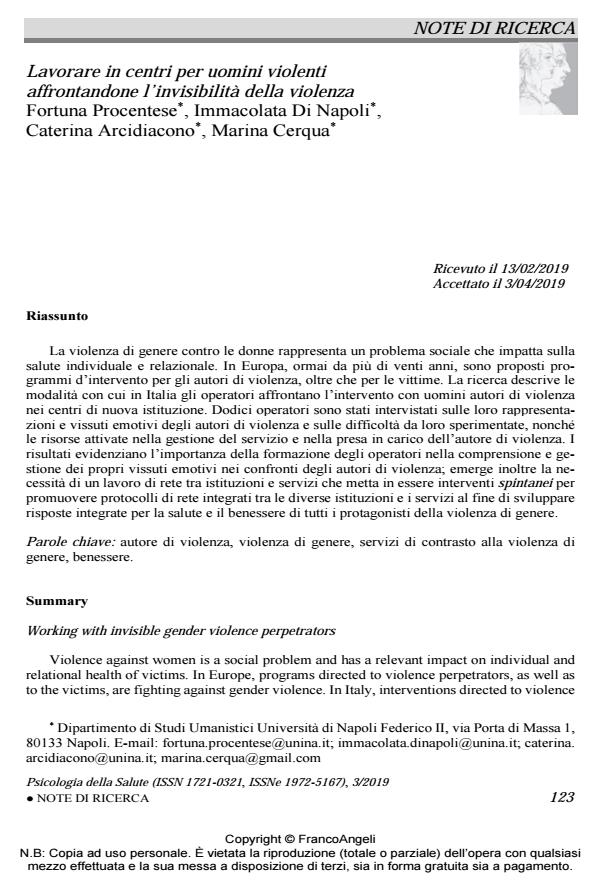Lavorare in centri per uomini violenti affrontandone l’invisibilità della violenza
Titolo Rivista PSICOLOGIA DELLA SALUTE
Autori/Curatori Fortuna Procentese, Immacolata Di Napoli, Caterina Arcidiacono, Marina Cerqua
Anno di pubblicazione 2019 Fascicolo 2019/3
Lingua Italiano Numero pagine 14 P. 123-136 Dimensione file 392 KB
DOI 10.3280/PDS2019-003007
Il DOI è il codice a barre della proprietà intellettuale: per saperne di più
clicca qui
Qui sotto puoi vedere in anteprima la prima pagina di questo articolo.
Se questo articolo ti interessa, lo puoi acquistare (e scaricare in formato pdf) seguendo le facili indicazioni per acquistare il download credit. Acquista Download Credits per scaricare questo Articolo in formato PDF

FrancoAngeli è membro della Publishers International Linking Association, Inc (PILA), associazione indipendente e non profit per facilitare (attraverso i servizi tecnologici implementati da CrossRef.org) l’accesso degli studiosi ai contenuti digitali nelle pubblicazioni professionali e scientifiche.
La violenza di genere contro le donne rappresenta un problema sociale che impatta sulla salute individuale e relazionale. In Europa, ormai da più di venti anni, sono proposti program-mi d’intervento per gli autori di violenza, oltre che per le vittime. La ricerca descrive le modali-tà con cui in Italia gli operatori affrontano l’intervento con uomini autori di violenza nei centri di nuova istituzione. Dodici operatori sono stati intervistati sulle loro rappresentazioni e vissuti emotivi degli autori di violenza e sulle difficoltà da loro sperimentate, nonché le risorse attivate nella gestione del servizio e nella presa in carico dell’autore di violenza. I risultati evidenziano l’importanza della formazione degli operatori nella comprensione e gestione dei propri vissuti emotivi nei confronti degli autori di violenza; emerge inoltre la necessità di un lavoro di rete tra istituzioni e servizi che metta in essere interventi spintanei per promuovere protocolli di rete integrati tra le diverse istituzioni e i servizi al fine di sviluppare risposte integrate per la salute e il benessere di tutti i protagonisti della violenza di genere.
Parole chiave:Autore di violenza, violenza di genere, servizi di contrasto alla violenza di genere, benessere.
- Minority Stress and Mental Health in Italian Bisexual People Cristiano Scandurra, Andrea Pennasilico, Concetta Esposito, Fabrizio Mezza, Roberto Vitelli, Vincenzo Bochicchio, Nelson Mauro Maldonato, Anna Lisa Amodeo, in Social Sciences /2020 pp.46
DOI: 10.3390/socsci9040046 - Mostra fotografica e facilitazione della riflessività. Una esperienza gruppale per il contrasto alla violenza sulle donne Caterina Arcidiacono, Nicole Bellanca, Paula Ascorra, Francesca Maria Galluccio, Stefania Carnevale, in PSICOLOGIA DI COMUNITA' 1/2025 pp.66
DOI: 10.3280/PSC2024-001005 - Healthcare Professionals’ Perceptions and Concerns towards Domestic Violence during Pregnancy in Southern Italy Fortuna Procentese, Immacolata Di Napoli, Filomena Tuccillo, Alessandra Chiurazzi, Caterina Arcidiacono, in International Journal of Environmental Research and Public Health /2019 pp.3087
DOI: 10.3390/ijerph16173087 - Violence Against Women: A Not in My Back Yard (NIMBY) Phenomenon Ciro Esposito, Immacolata Di Napoli, Concetta Esposito, Stefania Carnevale, Caterina Arcidiacono, in Violence and Gender /2020 pp.150
DOI: 10.1089/vio.2019.0067 - Downside: The Perpetrator of Violence in the Representations of Social and Health Professionals Fortuna Procentese, Roberto Fasanelli, Stefania Carnevale, Ciro Esposito, Noemi Pisapia, Caterina Arcidiacono, Immacolata Di Napoli, in International Journal of Environmental Research and Public Health /2020 pp.7061
DOI: 10.3390/ijerph17197061 - Ending Intimate Partner Violence (IPV) and Locating Men at Stake: An Ecological Approach Immacolata Di Napoli, Fortuna Procentese, Stefania Carnevale, Ciro Esposito, Caterina Arcidiacono, in International Journal of Environmental Research and Public Health /2019 pp.1652
DOI: 10.3390/ijerph16091652 - Children Witnessing Domestic Violence in the Voice of Health and Social Professionals Dealing with Contrasting Gender Violence Stefania Carnevale, Immacolata Di Napoli, Ciro Esposito, Caterina Arcidiacono, Fortuna Procentese, in International Journal of Environmental Research and Public Health /2020 pp.4463
DOI: 10.3390/ijerph17124463 - “Kept in Check”: Representations and Feelings of Social and Health Professionals Facing Intimate Partner Violence (IPV) Immacolata Di Napoli, Stefania Carnevale, Ciro Esposito, Roberta Block, Caterina Arcidiacono, Fortuna Procentese, in International Journal of Environmental Research and Public Health /2020 pp.7910
DOI: 10.3390/ijerph17217910 - The Use of Partial Least Squares–Path Modelling to Understand the Impact of Ambivalent Sexism on Violence-Justification among Adolescents Roberto Fasanelli, Ida Galli, Maria Gabriella Grassia, Marina Marino, Rosanna Cataldo, Carlo Natale Lauro, Chiara Castiello, Filomena Grassia, Caterina Arcidiacono, Fortuna Procentese, in International Journal of Environmental Research and Public Health /2020 pp.4991
DOI: 10.3390/ijerph17144991 - Combatting Intimate Partner Violence: Representations of Social and Healthcare Personnel Working with Gender-Based Violence Interventions Marcella Autiero, Fortuna Procentese, Stefania Carnevale, Caterina Arcidiacono, Immacolata Di Napoli, in International Journal of Environmental Research and Public Health /2020 pp.5543
DOI: 10.3390/ijerph17155543
Fortuna Procentese, Immacolata Di Napoli, Caterina Arcidiacono, Marina Cerqua, Lavorare in centri per uomini violenti affrontandone l’invisibilità della violenza in "PSICOLOGIA DELLA SALUTE" 3/2019, pp 123-136, DOI: 10.3280/PDS2019-003007